#decentralizedapps
Explore tagged Tumblr posts
Text
What is the Difference Between a Smart Contract and Blockchain?
In today's digital-first world, terms like blockchain and smart contract are often thrown around, especially in the context of cryptocurrency, decentralized finance (DeFi), and Web3. While these two concepts are closely related, they are not the same. If you’re confused about the difference between a smart contract and blockchain, you’re not alone. In this article, we’ll break down both terms, explain how they relate, and highlight their unique roles in the world of digital technology.
1. Understanding the Basics: Blockchain vs Smart Contract
Before diving into the differences, let’s clarify what each term means.
A blockchain is a decentralized digital ledger that stores data across a network of computers.
A smart contract is a self-executing program that runs on a blockchain and automatically enforces the terms of an agreement.
To put it simply, blockchain is the infrastructure, while smart contracts are applications that run on top of it.
2. What is a Blockchain?
A blockchain is a chain of blocks where each block contains data, a timestamp, and a cryptographic hash of the previous block. This structure makes the blockchain secure, transparent, and immutable.
The key features of blockchain include:
Decentralization – No single authority controls the network.
Transparency – Anyone can verify the data.
Security – Tampering with data is extremely difficult due to cryptographic encryption.
Consensus Mechanisms – Like Proof of Work (PoW) or Proof of Stake (PoS), which ensure agreement on the state of the network.
Blockchains are foundational technologies behind cryptocurrencies like Bitcoin, Ethereum, and many others.
3. What is a Smart Contract?
A smart contract is a piece of code stored on a blockchain that automatically executes when certain predetermined conditions are met. Think of it as a digital vending machine: once you input the right conditions (like inserting a coin), you get the output (like a soda).
Smart contracts are:
Self-executing – They run automatically when conditions are met.
Immutable – Once deployed, they cannot be changed.
Transparent – Code is visible on the blockchain.
Trustless – They remove the need for intermediaries or third parties.
Smart contracts are most commonly used on platforms like Ethereum, Solana, and Cardano.

4. How Smart Contracts Operate on a Blockchain
Smart contracts are deployed on a blockchain, usually via a transaction. Once uploaded, they become part of the blockchain and can't be changed. Users interact with these contracts by sending transactions that trigger specific functions within the code.
For example, in a decentralized exchange (DEX), a smart contract might govern the process of swapping one cryptocurrency for another. The logic of that exchange—calculations, fees, security checks—is all written in the contract's code.
5. Real-World Applications of Blockchain
Blockchains are not limited to cryptocurrencies. Their properties make them ideal for various industries:
Finance – Fast, secure transactions without banks.
Supply Chain – Track goods transparently from origin to destination.
Healthcare – Secure and share patient data without compromising privacy.
Voting Systems – Transparent and tamper-proof elections.
Any situation that requires trust, security, and transparency can potentially benefit from blockchain technology.
6. Real-World Applications of Smart Contracts
Smart contracts shine when you need to automate and enforce agreements. Some notable use cases include:
DeFi (Decentralized Finance) – Lending, borrowing, and trading without banks.
NFTs (Non-Fungible Tokens) – Automatically transferring ownership of digital art.
Gaming – In-game assets with real-world value.
Insurance – Auto-triggered payouts when conditions (like flight delays) are met.
Legal Agreements – Automatically executed contracts based on input conditions.
They’re essentially programmable agreements that remove the need for middlemen.
7. Do Smart Contracts Need Blockchain?
Yes. Smart contracts depend entirely on blockchain technology. Without a blockchain, there's no decentralized, secure, and immutable platform for the smart contract to run on. The blockchain guarantees trust, while the smart contract executes the logic.
8. Which Came First: Blockchain or Smart Contract?
Blockchain came first. The first blockchain, Bitcoin, was introduced in 2009 by the anonymous figure Satoshi Nakamoto. Bitcoin’s blockchain didn’t support smart contracts in the way we know them today. It wasn’t until Ethereum launched in 2015 that smart contracts became programmable on a large scale.
Ethereum introduced the Ethereum Virtual Machine (EVM), enabling developers to build decentralized applications using smart contracts written in Solidity.
9. Common Misconceptions
There are many misunderstandings around these technologies. Let’s clear a few up:
Misconception 1: Blockchain and smart contracts are the same.
Reality: They are separate components that work together.
Misconception 2: All blockchains support smart contracts.
Reality: Not all blockchains are smart contract-enabled. Bitcoin’s blockchain, for example, has limited scripting capabilities.
Misconception 3: Smart contracts are legally binding.
Reality: While they enforce logic, they may not hold legal standing in court unless specifically written to conform to legal standards.
10. Benefits of Using Blockchain and Smart Contracts Together
When used together, blockchain and smart contracts offer powerful advantages:
Security – Combined, they ensure secure automation of processes.
Efficiency – Remove delays caused by manual processing.
Cost Savings – Eliminate middlemen and reduce administrative overhead.
Trustless Interactions – Parties don't need to trust each other, only the code.
This combination is the backbone of decentralized applications (DApps) and the broader Web3 ecosystem.
11. Popular Platforms Supporting Smart Contracts
Several blockchain platforms support smart contracts, with varying degrees of complexity and performance:
Ethereum – The first and most widely used platform.
Solana – Known for speed and low fees.
Cardano – Emphasizes academic research and scalability.
Polkadot – Designed for interoperability.
Binance Smart Chain – Fast and cost-effective for DeFi apps.
Each platform has its own approach to security, scalability, and user experience.
12. The Future of Blockchain and Smart Contracts
The future looks incredibly promising. With the rise of AI, IoT, and 5G, the integration with blockchain and smart contracts could lead to fully automated systems that are transparent, efficient, and autonomous.
We may see:
Global trade systems are using smart contracts to automate customs and tariffs.
Self-driving cars using blockchain to negotiate road usage.
Smart cities are where infrastructure is governed by decentralized protocols.
These are not sci-fi ideas; they are already in development across various industries.
Conclusion: A Powerful Partnership
Understanding the difference between smart contracts and blockchain is essential in today's rapidly evolving digital world. While blockchain provides the secure, decentralized foundation, smart contracts bring it to life by enabling automation and trustless execution.
Think of blockchain as the stage, and smart contracts as the actors that perform on it. Separately, they're impressive. But together, they're revolutionary.
As technology continues to evolve, the synergy between blockchain and smart contracts will redefine industries, reshape economies, and unlock a new era of digital transformation.

#coin#crypto#digital currency#finance#invest#investment#bnbbro#smartcontracts#decentralization#decentralizedfinance#decentralizedapps#decentralizedfuture#cryptocurrency#btc#cryptotrading#usdt
2 notes
·
View notes
Text
Is Blockchain Right for Your Business? Here’s What Top Development Firms Say
Determining if blockchain technology is the right fit for your business requires a careful evaluation of its unique properties against your specific operational challenges. It is not a universal solution, but for certain problems involving trust, transparency, and data integrity, leading development firms agree that blockchain offers distinct advantages that traditional systems cannot. Understanding these nuances is key to making an informed decision.
What is Blockchain for Business?
Blockchain for business refers to the application of distributed ledger technology (DLT) beyond cryptocurrencies, focusing on enterprise-grade solutions that enhance efficiency, security, and transparency. It involves creating private or permissioned blockchain networks where only authorized participants can access and validate data, offering a controlled environment for business operations. This differentiates it from public, open networks.
Top blockchain development company firms specialize in designing and implementing these tailored solutions. Their work includes developing custom blockchain protocol development to define the rules of a network, building decentralized application (DApp) development specific to business needs, and implementing smart contract development to automate complex agreements. The goal is to provide a robust, verifiable system for managing transactions and data among multiple parties.

Why Consider Blockchain for Your Business?
Businesses should consider blockchain when faced with specific challenges related to data security, operational inefficiencies, or the need for increased trust among participants. It is particularly relevant when current systems are centralized, opaque, or prone to fraud and delays. Blockchain offers a new paradigm for solving these deeply ingrained issues.
One primary reason is the demand for verifiable trust and transparency. Many traditional business processes rely on intermediaries to establish trust, which can add costs and introduce friction. Blockchain provides a shared, immutable database where transactions are recorded securely and transparently across multiple blockchain nodes. This creates an undeniable audit trail, which is much more important for industries like supply chain or finance where provenance and authenticity are critical. This inherent transparency reduces the need for constant verification and reconciliation.
Another compelling factor is enhanced data security and integrity. Cyberattacks and data breaches are constant threats to centralized systems. Blockchain's decentralized nature and cryptographic encryption make it highly resistant to tampering. Even if one part of the network is compromised, the integrity of the data is maintained across other nodes. This provides a level of resilience and trustworthiness that traditional databases often lack, protecting sensitive business information and customer data.
Essential Features That Benefit Businesses
When top development firms discuss blockchain's suitability for a business, they highlight several essential features that deliver significant operational and strategic advantages. These features are what make blockchain a unique and powerful tool for specific business contexts.
A key feature is the power of smart contract development. These self-executing contracts automate agreements based on predefined conditions, removing the need for manual processing and third-party oversight. For example, a smart contract could automatically release payment to a supplier once goods are verified as delivered on a blockchain development for supply chain management system. This streamlines workflows, reduces human error, and speeds up transaction settlements.
Another crucial aspect is Web3 development services. This refers to building applications and experiences for a decentralized internet where users have greater control over their data and identity. For businesses, this means creating customer-facing platforms that offer enhanced privacy, security, and direct engagement, fostering stronger customer relationships based on transparency rather than centralized control. Expertise in Solidity programming is often central to creating these advanced DApp development solutions, especially on widely used platforms like Ethereum.
The capability for robust distributed ledger technology ensures that records are consistent and verifiable across all participating parties. Instead of each entity maintaining its own separate database, a shared, synchronized ledger provides a single source of truth. This reduces discrepancies, simplifies auditing, and improves collaboration among business partners. It enables a higher degree of data consistency and reliability.
Furthermore, leading firms emphasize the flexibility in consensus algorithms, an important LSI keyword. While public blockchains might use energy-intensive algorithms, enterprise blockchains can opt for more efficient and faster consensus mechanisms like Proof of Authority or Proof of Elapsed Time. This allows businesses to choose a consensus model that balances security, decentralization, and performance based on their specific needs, optimizing the cost to build a blockchain application and its operational efficiency.
Core Benefits for Businesses Considering Blockchain
For businesses evaluating blockchain, the benefits extend across various operational and strategic domains, fundamentally improving how they conduct business. These benefits are what top development firms emphasize when recommending blockchain.
One significant benefit is improved operational efficiency and cost reduction. By automating processes with smart contracts and reducing the need for intermediaries, businesses can cut down on manual tasks, paperwork, and associated fees. This leads to faster transaction times and streamlined workflows, directly impacting the bottom line. For instance, removing intermediaries in cross-border payments can significantly reduce processing times and costs.
Another advantage is enhanced accountability and traceability. Every transaction recorded on a blockchain is time-stamped and linked to previous ones, creating an unchangeable history. This provides an indisputable audit trail for assets, products, or data, which is much more important for compliance, dispute resolution, and proving authenticity. This improved traceability is invaluable in complex supply chains or regulatory environments.
Blockchain also enables new business models and revenue streams. By leveraging cryptocurrency development or tokenization, businesses can create digital assets, fractional ownership of physical assets, or loyalty programs that operate on a blockchain. This opens up innovative ways to engage with customers, raise capital, and create value within their ecosystem. They can also provide new services through DApp development solutions that cater to decentralized markets.
Finally, blockchain offers a higher degree of security against fraud and cyber threats. The decentralized and encrypted nature of the blockchain makes it extremely difficult for malicious actors to alter records or compromise the entire system. This enhanced security builds greater trust among all participants in a business network, from customers to suppliers. This is much more important for protecting sensitive data and maintaining business continuity.
When Is Blockchain the Right Fit?
Top development firms generally advise that blockchain is right for your business if you answer "yes" to most of these questions:
Do you need to record transactions or data that involve multiple parties who do not fully trust each other? Blockchain shines in scenarios where trust is low or expensive to establish, such as in consortiums or multi-party supply chains.
Is transparency and immutability of data critical for your operations? If an unchangeable record of events or data is essential for regulatory compliance, auditing, or proving provenance, blockchain offers a superior solution.
Are intermediaries adding significant costs, delays, or complexity to your processes? If third parties are central to your business processes (e.g., banks, escrow services, clearinghouses), blockchain can remove or reduce their necessity through smart contract development.
Do you deal with assets that need to be traced or verified from origin to destination? From luxury goods to pharmaceuticals, blockchain can provide granular, verifiable traceability that traditional methods cannot easily achieve.
Is data security and resistance to tampering a paramount concern? If your business handles sensitive information where a single point of failure could be catastrophic, an immutable database on a blockchain provides robust protection.
Are you looking to create new, decentralized business models or enhance customer interaction through digital ownership and privacy? Web3 development services and DApp development solutions can open new avenues for engaging with users directly.
If your business relies heavily on the answers to these questions, then exploring blockchain with a specialized blockchain development company is likely a strategic imperative. They can hire blockchain developers for smart contracts and other functionalities crucial to your needs.
Conclusion
Deciding "Is Blockchain Right for Your Business?" depends on a careful assessment of your specific operational challenges and strategic goals. Top development firms agree that while not a cure-all, blockchain provides unparalleled solutions for issues related to trust, transparency, security, and efficiency in multi-party environments. By leveraging its core features—from smart contract development to distributed ledger technology—businesses can unlock significant benefits, redefine their operations, and gain a competitive edge.
To understand how blockchain can uniquely serve your company's needs, consider consulting with a leading blockchain development company. They can provide expert guidance and help you build tailored solutions that truly fit your business.
#BlockchainDevelopment#BlockchainSolutions#Web3Development#SmartContracts#DecentralizedApps#CryptoDevelopment
1 note
·
View note
Text
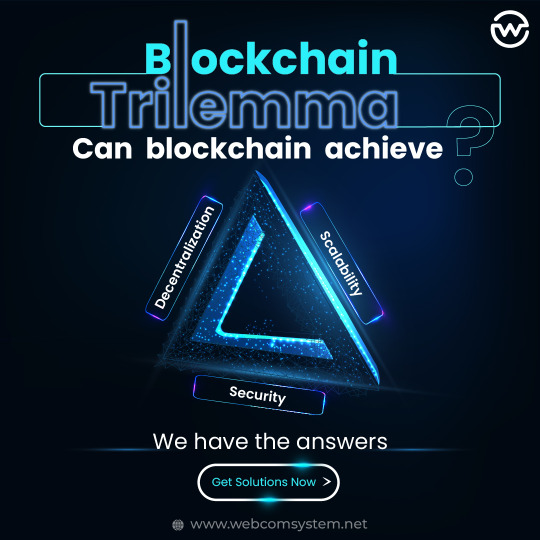
⚖️Balancing decentralization, scalability, and security is the biggest challenge in blockchain development, known as the 𝐁𝐥𝐨𝐜𝐤𝐜𝐡𝐚𝐢𝐧 𝐓𝐫𝐢𝐥𝐞𝐦𝐦𝐚.
💡𝐀𝐭 𝐖𝐞𝐛𝐜𝐨𝐦 𝐒𝐲𝐬𝐭𝐞𝐦𝐬, a trusted blockchain development company, we specialize in creating innovative solutions that address this challenge head-on.
🔗Whether you're building decentralized applications, secure smart contracts, or scalable blockchain networks, we have the expertise to help you achieve the perfect balance.
🚀𝐋𝐞𝐭’𝐬 𝐬𝐡𝐚𝐩𝐞 𝐭𝐡𝐞 𝐟𝐮𝐭𝐮𝐫𝐞 𝐨𝐟 𝐛𝐥𝐨𝐜𝐤𝐜𝐡𝐚𝐢𝐧 𝐭𝐨𝐠𝐞𝐭𝐡𝐞𝐫
📧 [email protected] 🌎 www.webcomsystem.net 📱 +91 8699 701 099
#BlockchainTrilemma#Decentralization#BlockchainDevelopment#WebcomSystems#ScalableBlockchain#SmartContracts#DecentralizedApps#BlockchainInnovation#SecureBlockchain#TechSolutions#BlockchainTechnology#BlockchainExpertise#InnovativeSolutions#DAppDevelopment#BlockchainFuture#BlockchainChallenges#BlockchainScaling#SecureSmartContracts#BlockchainEcosystem#BlockchainSolutions
1 note
·
View note
Text
dApp Development Company
Looking to revolutionize the blockchain space? Build powerful dApps with InnBlockchain!
InnBlockchain offers complete dApp development services, covering everything from custom smart contracts to seamless blockchain integration. From initial development to final deployment, we ensure a smooth and reliable user experience. Let our experts handle the code so you can stay focused on your vision.
Launch faster with Innblockchain’s reliable dApp development services!
Know more>>

#defi#dappdevelopment#dapps#decentralizedapps#decentralized finance#decentralizedfuture#cryptocurrency trading#crypto exchange
0 notes
Text
Why settle for generic when you can build decentralized applications tailored to your vision? Our custom DApp development services unlock new possibilities for DeFi, GameFi, NFT platforms, and enterprise blockchain solutions. Explore the future of Web3 today 👉 https://www.osiztechnologies.com/dapp-development
#DAppDevelopmentCompany#Tokenization#CustomDApps#DecentralizedFinance#DAppBuilders#CryptoInnovation#Web3Startups#DecentralizedApps
0 notes
Text

Step Into the Future with Web 3.0 Development At ITIO Innovex Private Limited, we are shaping the next generation of the internet—decentralized, secure, and user-empowered. From dApps and DeFi platforms to smart contracts and decentralized identity solutions, our Web 3.0 development services empower businesses to thrive in a blockchain-powered digital era. Ownership, transparency, and privacy are no longer optional—they’re built-in. Partner with ITIO Innovex to lead the transformation into a trustless, peer-to-peer internet.
#decentralizedapps#blockchain#blockchaintechnology#defisolutions#futureofweb#crypto#cryptoinovation#web3development
0 notes
Link
0 notes
Text
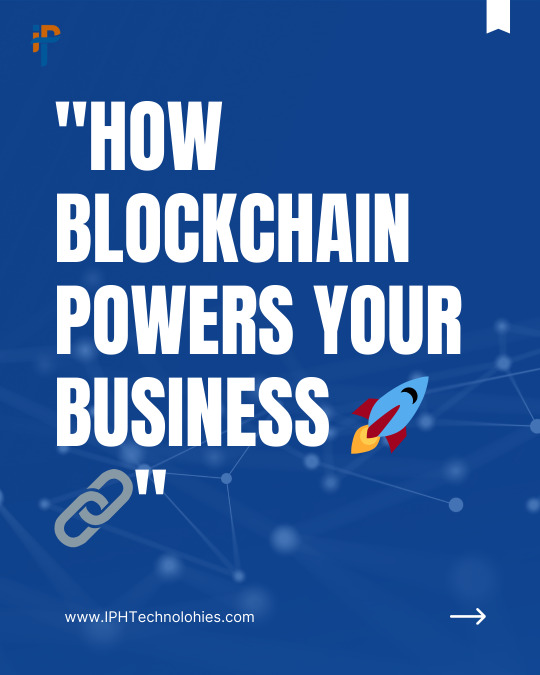


How Blockchain Powers Your Business 🚀🔗
Empower your business with secure, transparent blockchain solutions today!
#blockchainsolutions#businessinnovation#futureready#digitaltransformation#smartcontracts#blockchaintechnology#SecureBusiness#CryptoSolutions#DecentralizedApps#Web3Development
0 notes
Text
Web3 Technologies: Practical Applications for Traditional Software Companies

Get ready to explore the next evolution of the internet with Web3 technologies! Dive into how blockchain, decentralized applications, and smart contracts are reshaping digital experiences empowering users. Stay ahead by understanding the trends and opportunities Web3 brings for businesses and innovators!
📖 Read more: https://www.sapphiresolutions.net/blog/web3-technologies
0 notes
Text
Blockchain Development Services

Fuel your business growth with Pixel Punch’s advanced blockchain development services. Our skilled team designs secure and scalable decentralized applications, smart contracts, and customized blockchain frameworks to fit your specific needs. Whether you’re launching a DeFi platform, an NFT marketplace, or an enterprise blockchain solution, we ensure a seamless and efficient process.
#BlockchainDevelopment#Web3Development#SmartContracts#DAppDevelopment#CryptoSolutions#BlockchainTechnology#DeFiDevelopment#NFTDevelopment#CustomBlockchain#TokenDevelopment#BlockchainServices#Web3Experts#DecentralizedApps#CryptoDevelopment#PixelPunchTech
1 note
·
View note
Text
Web3 development companies are reshaping industries by building decentralized applications and blockchain solutions. These firms focus on creating secure, transparent, and user-centric platforms leveraging blockchain technology to enhance digital experiences.
As the Web3 ecosystem grows, top firms prioritize scalability and innovation, delivering solutions for decentralized finance and NFTs. Check the article for more details.
0 notes
Text
The Ultimate Guide to Blockchain Development Services for Startups in 2025
For startups in 2025, embracing blockchain development services is no longer a futuristic concept but a strategic imperative. The unique advantages of distributed ledger technology, from enhanced security and transparency to unparalleled efficiency, offer a potent competitive edge in a crowded market. Whether a startup aims to revolutionize supply chains, build innovative financial products, or create new digital experiences, a well-executed blockchain strategy can unlock immense value. This guide provides a comprehensive overview of what modern blockchain development services entail for burgeoning businesses, highlighting why and how they should leverage this transformative technology to build resilient, scalable, and impactful solutions in the coming years.
What are Blockchain Development Services for Startups?
Blockchain development services for startups refer to specialized offerings from blockchain development companies that assist new businesses in leveraging distributed ledger technology to build their products, platforms, or internal systems. These services encompass the entire lifecycle of blockchain adoption, from initial concept and feasibility studies to the design, development, deployment, and ongoing maintenance of blockchain-based solutions.
For a startup, these services mean gaining access to expertise in various aspects of blockchain, including blockchain protocol development, which involves selecting or building the underlying network. It also includes smart contract development, where self-executing agreements are coded, and decentralized application (DApp) development, which focuses on creating user-facing applications that interact with the blockchain. Additionally, these services can involve setting up and managing blockchain nodes, ensuring data integrity with an immutable database, and advising on suitable consensus algorithms. Essentially, these services provide a streamlined path for startups to integrate Web3 development services into their business model without needing to build an extensive in-house blockchain team from scratch.

Why Blockchain is Crucial for Startups in 2025
For startups launching in 2025, integrating blockchain development services is not just an option but a critical strategy for growth and differentiation. The digital landscape demands solutions that offer more than traditional systems, and distributed ledger technology provides a unique set of advantages that align perfectly with the agile and innovative nature of new businesses.
Firstly, blockchain offers unparalleled security and transparency. Startups often deal with sensitive data or financial transactions, and blockchain's cryptographic security and immutable database provide a level of trust that can significantly attract early adopters and investors. This trust is much more important for building a strong reputation from the ground up. Secondly, blockchain enables disintermediation and cost reduction. By automating processes through smart contracts and removing intermediaries, startups can operate with greater efficiency and lower transaction fees, which is crucial for managing the cost to build a blockchain application and maintaining lean operations.
Thirdly, blockchain fosters innovation and differentiation. It allows startups to create entirely new business models and products that are not feasible with traditional technology. Whether it is launching a new cryptocurrency development project, building unique decentralized application (DApp) solutions, or revolutionizing blockchain development for supply chain management, blockchain provides the foundation for groundbreaking services. Fourthly, it offers global accessibility and financial inclusion. Blockchain platforms are inherently global, allowing startups to reach a wider audience and conduct transactions across borders with ease, opening up new markets for their Web3 development services. Finally, for startups, early adoption of this technology demonstrates forward-thinking and a commitment to future-proof solutions, positioning them as leaders in their respective industries and attracting top talent.
Essential Features of Blockchain Development Services for Startups
When a startup seeks to hire blockchain developers for smart contracts or engage a full-service blockchain development company, they should look for several essential features in the services offered. These features ensure that the partnership will be effective and that the developed solution aligns with their strategic goals.
A crucial feature is strategic consulting and ideation. A valuable provider will not just code but will collaborate with the startup to identify viable blockchain use cases, refine their concept, and determine the most suitable blockchain protocol development for their needs (e.g., Ethereum blockchain development for DApps or Hyperledger for enterprise solutions). They should help the startup understand how various consensus algorithms impact performance and security. Another essential feature is full-stack blockchain development capabilities. This means the company can handle both the backend (blockchain network, smart contracts, blockchain nodes) and the frontend (user interfaces for decentralized application (DApp) solutions). Proficiency in languages like Solidity programming for smart contract creation is vital.
Furthermore, a strong emphasis on security auditing and testing is non-negotiable. For startups, security vulnerabilities can be catastrophic. The service provider should have rigorous processes for testing smart contracts and the overall network to ensure the integrity of the immutable database. Scalability and future-proofing are also key; the developed solution should be able to grow with the startup’s user base and adapt to evolving Web3 development services trends. Finally, a good provider offers post-deployment support and maintenance. This ensures the blockchain application remains functional, secure, and up-to-date after launch, which is much more important for startups that may lack the internal resources for ongoing management. They should also be familiar with the best blockchain development tools for startups to ensure efficient and effective development.
The Benefits of Partnering with a Blockchain Development Company for Startups
Partnering with a specialized blockchain development company offers distinct benefits for startups, providing them with the expertise and resources necessary to successfully implement distributed ledger technology without the inherent challenges of building an in-house team from scratch.
Firstly, startups gain immediate access to specialized expertise. Building a competent blockchain team internally requires significant time and investment in hiring, training, and retaining talent proficient in Solidity programming, blockchain protocol development, and smart contract development. A dedicated company already possesses this expertise, allowing the startup to bypass the learning curve and accelerate their project timeline. This is much more important for quickly bringing innovative solutions to market.
Secondly, a partnership leads to cost efficiency and optimized resource allocation. While it might seem counterintuitive, hiring a third-party service can be more cost-effective than building an in-house team, especially considering the high demand for skilled blockchain professionals and the cost to build a blockchain application from scratch. Startups can avoid large overheads associated with salaries, benefits, and infrastructure, paying only for the services they need. This allows them to allocate their limited capital to other critical areas of their business.
Thirdly, specialized companies bring enhanced security and risk mitigation. They adhere to industry best practices for secure coding, conduct rigorous audits of smart contracts, and implement robust measures to protect blockchain nodes and the immutable database. This significantly reduces the risk of vulnerabilities and cyberattacks, safeguarding the startup's assets and reputation. Fourthly, they offer scalability and flexibility. A professional blockchain development company can design solutions that scale with the startup's growth and adapt to changing market conditions and technological advancements in Web3 development services. This ensures the longevity and relevance of the blockchain investment, whether it is for cryptocurrency development or blockchain development for supply chain management. Lastly, external partners provide unbiased insights and strategic guidance, helping startups identify the most impactful blockchain use cases and avoid common pitfalls, ensuring their blockchain initiative truly aligns with their business objectives.
Key Considerations for Startups When Choosing a Provider
For startups, selecting the right blockchain development company is a pivotal decision that will shape their technological foundation and future growth. Several key considerations should guide their choice to ensure a successful partnership in 2025.
First and foremost, assess their understanding of the startup ecosystem and specific industry needs. A good blockchain development company for startups will understand the unique challenges and constraints of new businesses, from limited budgets to the need for rapid prototyping. They should demonstrate a clear comprehension of how distributed ledger technology can be applied to their specific industry, whether it's finance, healthcare, or blockchain development for supply chain management.
Secondly, evaluate their technical stack and expertise in relevant protocols. Does the company specialize in Ethereum blockchain development, Hyperledger, Solana, or other protocols relevant to their vision? Do they have strong capabilities in Solidity programming for smart contract development and building various decentralized application (DApp) solutions? Their familiarity with the best blockchain development tools for startups is also important, as this reflects their efficiency and adoption of modern practices. This technical alignment is much more important for ensuring the chosen technology can support their goals.
Thirdly, scrutinize their project management methodology and communication style. Startups thrive on agility and clear communication. Look for a company that employs agile development, provides regular updates, and fosters an open, collaborative environment. Transparency in their processes helps manage expectations and adapt quickly to changes. Fourthly, consider their approach to security and compliance. For a startup, a security breach can be devastating. Inquire about their security auditing processes for smart contracts and their understanding of regulatory frameworks related to cryptocurrency development or Web3 development services. Finally, evaluate their post-launch support and maintenance offerings. A long-term partner will provide ongoing assistance to ensure the blockchain solution remains stable, secure, and performant as the startup evolves.
Building a Scalable and Secure Blockchain Solution
For startups, building a blockchain solution that is not only functional but also scalable and secure is paramount for long-term success. A competent blockchain development company will prioritize these aspects from the initial design phase.
Scalability refers to the ability of the blockchain network and its applications to handle an increasing volume of transactions and users without performance degradation. For a startup planning for rapid growth, this is crucial. The choice of blockchain protocol development plays a significant role here, with some protocols inherently offering better scalability than others, often influenced by their consensus algorithms. The architecture of decentralized application (DApp) solutions also needs to be designed with scalability in mind, often by leveraging Layer 2 solutions or off-chain processing when appropriate. This forethought about scaling is much more important for avoiding costly re-architecture later.
Security, on the other hand, is non-negotiable for any solution built on distributed ledger technology. A professional blockchain development company implements robust security measures throughout the entire development lifecycle, from secure Solidity programming practices for smart contract development to thorough vulnerability testing and auditing. They ensure the integrity of the immutable database and the resilience of blockchain nodes against attacks. For startups venturing into areas like cryptocurrency development or managing sensitive data, this includes adherence to best practices in cryptography and access control. By focusing on both scalability and security, the chosen blockchain development company helps the startup build a robust foundation that can withstand the rigors of real-world use and grow with their business.
The Role of Smart Contracts and DApps for Startups
For startups looking to innovate with distributed ledger technology in 2025, smart contract development and decentralized application (DApp) solutions are at the core of their potential. These technologies enable new business models, automate processes, and build unprecedented trust.
Smart contracts are self-executing agreements with the terms of the agreement directly written into code. For a startup, they offer immense value by automating processes, reducing the need for intermediaries, and ensuring tamper-proof execution of agreements. Imagine a startup in blockchain development for supply chain management using a smart contract to automatically release payment to a supplier once goods are verified upon arrival. This reduces administrative overhead, minimizes disputes, and enhances efficiency. Proficiency in Solidity programming for Ethereum blockchain development is particularly important here, as Ethereum remains a leading platform for smart contracts.
Decentralized applications (DApps) are applications that run on a blockchain protocol development instead of a centralized server. They are transparent, resistant to censorship, and often foster greater user participation. For startups, DApps open doors to creating novel Web3 development services like decentralized social media, gaming platforms, or unique financial instruments. A blockchain development company specializing in DApp development solutions can help a startup design intuitive user interfaces that seamlessly interact with the underlying smart contracts and blockchain nodes. This ability to build trustless, transparent, and user-centric applications is much more important for startups aiming to disrupt traditional industries and attract a tech-savvy user base.
Conclusion
For startups navigating the dynamic digital landscape of 2025, strategically leveraging blockchain development services is a clear path to innovation, efficiency, and sustained growth. The decision to partner with the right blockchain development company is critical, as they provide not only the technical expertise in areas like smart contract development and decentralized application (DApp) solutions but also the strategic guidance necessary to realize their vision. By focusing on providers with deep knowledge of distributed ledger technology, a commitment to security, and a strong understanding of the startup's unique needs, new businesses can build scalable, robust, and impactful blockchain applications. Embracing these services allows startups to unlock unprecedented opportunities, differentiate themselves in competitive markets, and truly shape the decentralized future.
Ready to transform their startup with cutting-edge blockchain technology? Connect with a leading blockchain development company today to discuss their innovative ideas and build their future-ready solution.
#BlockchainDevelopment#BlockchainSolutions#SmartContractDevelopment#Web3Developers#DecentralizedApps
1 note
·
View note
Text

How Blockchain is Changing the Mobile App Industry
Blockchain technology is revolutionizing the mobile app industry by offering enhanced security, transparency, and decentralization. With blockchain, mobile apps can provide secure transactions, protect user data from breaches, and ensure trust through smart contracts. This technology is especially beneficial in sectors such as finance, supply chain, and healthcare, where secure data handling is crucial. Additionally, blockchain enables new business models, like tokenization and decentralized applications (dApps), creating opportunities for more innovative and secure mobile experiences. The future of mobile apps is undeniably being shaped by the power of blockchain.
#BlockchainApps#MobileAppBlockchain#BlockchainTech#BlockchainInnovation#MobileAppSecurity#DecentralizedApps#BlockchainSolutions#FutureOfApps#BlockchainRevolution#AppDevBlockchain
0 notes
Text


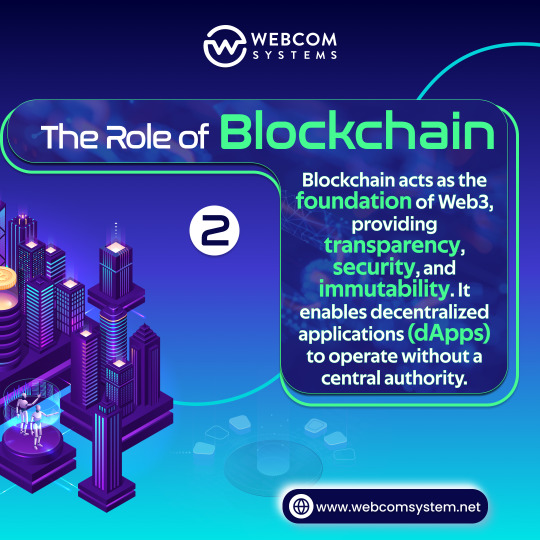
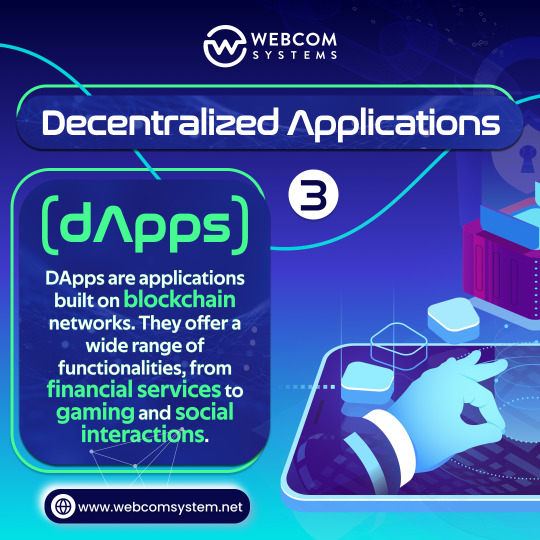
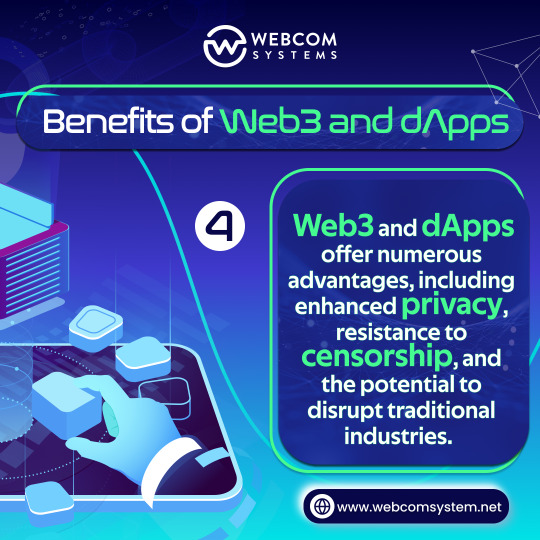

📱 𝐖𝐞𝐛𝟑: 𝐀 𝐃𝐞𝐜𝐞𝐧𝐭𝐫𝐚𝐥𝐢𝐳𝐞𝐝 𝐅𝐮𝐭𝐮𝐫𝐞 𝐏𝐨𝐰𝐞𝐫𝐞𝐝 𝐛𝐲 𝐁𝐥𝐨𝐜𝐤𝐜𝐡𝐚𝐢𝐧 ⛓️💥
💁♂️ 𝐖𝐞𝐛𝟑 represents the future of the internet, driven by blockchain technology. It enables 𝐃𝐞𝐜𝐞𝐧𝐭𝐫𝐚𝐥𝐢𝐳𝐞𝐝 𝐀𝐩𝐩𝐥𝐢𝐜𝐚𝐭𝐢𝐨𝐧𝐬 (dApps), fostering a more secure, transparent, and user-controlled ecosystem. 𝐖𝐞𝐛𝐜𝐨𝐦 𝐒𝐲𝐬𝐭𝐞𝐦𝐬 specializes in developing 𝐁𝐥𝐨𝐜𝐤𝐜𝐡𝐚𝐢𝐧 𝐒𝐨𝐥𝐮𝐭𝐢𝐨𝐧𝐬, helping businesses unlock the potential of Web3 for transformative, 𝐃𝐞𝐜𝐞𝐧𝐭𝐫𝐚𝐥𝐢𝐳𝐞𝐝 𝐃𝐢𝐠𝐢𝐭𝐚𝐥 𝐄𝐱𝐩𝐞𝐫𝐢𝐞𝐧𝐜𝐞𝐬.
📧 𝐄𝐦𝐚𝐢𝐥:[email protected] 🌎 𝐋𝐢𝐧𝐤:- https://www.webcomsystem.net ☎️ 𝐆𝐞𝐭 𝐢𝐧 𝐓𝐨𝐮𝐜𝐡 𝐖𝐢𝐭𝐡 𝐔𝐬 𝐓𝐨𝐝𝐚𝐲 at 📱 +91 8699 701 099 𝐒𝐭𝐚𝐫𝐭 𝐖𝐢𝐭𝐡 𝐀 𝐐𝐮𝐨𝐭𝐞!!
#WebcomSystems#Web3#BlockchainTechnology#DecentralizedFuture#dApps#BlockchainDevelopment#CryptoInnovation#DigitalTransformation#FutureOfTheInternet#SecureWeb#BlockchainSolutions#Web3Revolution#DecentralizedApps#Web3Development#SmartContracts
1 note
·
View note
Text

Got a DApp idea? We turn concepts into high-performance decentralized applications! Explore our End-to-End DApp Development Solutions and lead the Web3 future.
Check out how we can help: https://www.osiztechnologies.com/dapp-development
#DAppDevelopment#Web3#BlockchainExperts#CryptoSolutions#DeFiApps#DecentralizedApps#DAppDevelopmentServices
0 notes
Text

Intelisync is the Best Blockchain Development Company based in Dubai, UAE, specializing in delivering innovative and secure blockchain solutions for businesses worldwide. Our team of expert developers creates custom blockchain applications, smart contracts, decentralized apps (dApps), and enterprise-level blockchain systems. As the leading blockchain development company, we help businesses enhance security, transparency, and efficiency through the power of blockchain technology. Whether you're launching a cryptocurrency platform, integrating blockchain into your operations, or exploring decentralized technologies, Intelisync offers the best solutions to drive your business forward. Partner with Intelisync, the Best Blockchain Development Company, and transform your business with cutting-edge blockchain solutions.
#Intelisync#BlockchainDevelopment#BestBlockchainDevelopmentCompany#BlockchainSolutions#DubaiBlockchain#BlockchainTechnology#SmartContracts#DecentralizedApps#BlockchainInnovation#BlockchainExperts#EnterpriseBlockchain#CryptoDevelopment#BlockchainServices#DigitalTransformation#UAEBlockchain#BlockchainDevelopmentCompany#BlockchainForBusiness#BlockchainIntegration#DistributedLedger#BlockchainSecurity
1 note
·
View note